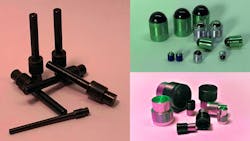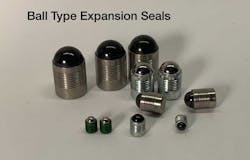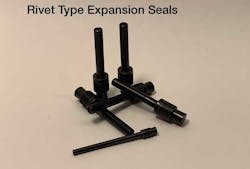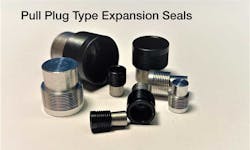Whether industrial hydraulics, automotive, oil and gas, medical, aerospace or other industries, choosing the best permanent sealing solution is mission-critical. Failure is not an option. Here are five critical components that must be considered to ensure the proper selection of permanent seals.
Base Materials
Expansion sealing plugs permanently seal holes using one of two different ways, depending on the hardness of the base material the plug is being installed in. If the base is harder than the plug’s material, the plug depends on the surface finish requirement of the base material (typically 10-30 Rz). Then, during installation, the plug expands radially and its material flows into the roughness of the base material to secure it in place.
If, however, the plug is harder than the base, then serrations on the plug “bite” or “dig” into the hole when it radially expands to secure it. In either case, the expansion plugs make a 100% leak free permanent seal.
Knowing the base material is also important for reducing corrosion. It lets engineers choose plugs made out of materials that will not establish a galvanic cell when in contact with the base material.
Pressure Requirements
Pressure performance is simply the psi/bar requirement of the permanent seal, and all plugs have pressure ratings as well as safety ratings. Understanding this lets designer determine which type of plugs best meets the pressure performance requirements of the application at hand.
Machining Capabilities
Companies need to know what their machining and designing capabilities are when choosing plugs. They need to know if they can machine the proper holes needed for the expansion plug they choose. Fortunately, expansion plugs will work in range of variety of holes with range of tolerances for the diameter, roundness, wall thicknesses, proximity to another hole or exterior edge, and the desired depth of installation. They can also be installed in tapered, counterbored and straight holes.
Standard plugs come in English sizes from 0.093 to 0.875 in. and metric sizes from 3 mm to 22 mm. There are also several plugs that can produced in larger sizes.
Installation
A significant factor in deciding on the best expansion plug depends on how it will be installed. Plugs can require fully automated or manual installation. Some are best for low-volume applications, while others can be installed by the millions annually. Some plugs are installed using fixtures and a press, some require handheld hammers and set tools, and others call for hydro-pneumatic installation tools.
There are some plugs that need to be installed up to 90 mm deep in the hole, but most are installed near the surface. And some plugs take longer than others to install. All of this needs to be considered when selecting expansion plugs.
Overall Costs
Companies should not choose an expansion plug based solely on the per piece price as that is not the overall cost of using an expansion plug. It is often advisable to consult with a sealing expert, such as a supplier or a company that makes expansion plugs, and let them assesses the overall cost.
They understand the costs created by various combinations of base materials, pressure performance requirements, and a company’s machining needs and capabilities, as well as the preferred installation method. Experienced sealing experts understand the overall costs associated with expansion plugs and can offer options.
Brian Krieger is North American vice president of sales and global marketing manager for Engineered Inserts & Systems Inc., a company based in Connecticut that makes sealing and flow control products.
About the Author

Leaders relevant to this article:




